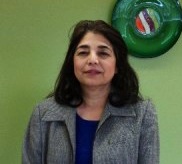Irma Bustamante: Phoenix Children’s Hospital

Irma Bustamante was told by her high school counselor that she should look into a job as a secretary because her people don’t do well in college. However, Bustamante overcame barriers placed on her by others and has worked to make sure any non-English speaker gets equal care under her watch at Phoenix Children’s Hospital.
She said other’s stereotypical beliefs of her as a Hispanic woman motivates her to succeed, Bustamante spent her years after high school gaining a college education at Arizona State University, and then graduate school at Georgetown University, earning a bachelor’s in Political Science and Latin American Studies.
While attending school in D.C., she volunteered as an interpreter at Georgetown University Hospital. Bustamante said it was during her volunteer work interpreting for refugees from Central and South America that she saw “the necessity for bilingual people working in health care.”
Bustamante’s experiences at the hospital prompted her to leave Washington, D.C. and relocate to Tucson to attend medical school at the University of Arizona, where once again she faced narrow-mindedness from peers in her classes.
“I remember some individuals who would say, under their breath and sometimes to my face, ‘How did you get into medical school?’” Bustamante said. “Sometimes it was so subtle, I wasn’t sure if it was because I was a woman or Latino.”
She left medical school after three years, deciding that she wanted to spend her time researching how to provide language and cultural access in the healthcare system to people of minority groups. Bustamante volunteered her bilingual ability to as many healthcare services as she could while she researched and gave cultural training at Maricopa County Medical Center.
Bustamante, 60, now works as the manager of language services, interpretation, translation and cultural training at Phoenix Children’s Hospital. At her job she spends time making sure that any non-English speaker who goes through the emergency room receives assistance from an interpreter. This ensures that the patient and patient’s family can understand the information provided by their doctors.
Marcela Testai, Spanish translator coordinator at Phoenix Children’s, agreed that “the better you can communicate with the patients the less likely confusion may occur down the line.”
At Phoenix Children’s Hospital 19 percent of the patients that they handle are Spanish speaking, and the hospital provides them interpreters and translators to assist. Another 1 percent fall into the category of other, which accounts for other languages that the hospital encounters. Some examples are: Burmese, Swahili, Arabic, French, and Somali.
If there are languages that the hospital does not have trained staff for, Testai said that they contract out to other translating companies that speak those languages.
“It very important that we never use children or family as medical interpreters,” Bustamante said, knowing firsthand the difficulty of being a child interpreter.
At the age of nine Bustamante’s father, who was her only parent who spoke English, passed away; from then on she was the interpreter for her Spanish-speaking mother. Since she was the oldest of six girls, Bustamante became the role model for her younger siblings. Bustamante said it’s part of the Latino culture that the oldest is made an example of, and that responsibility has followed her throughout the years.
Juanita Franco, interpreter and dispatcher at Phoenix Children’s Hospital, said Bustamante’s goal-oriented manner as a boss and a friend has helped her in many ways.
“She’s a great boss and a role model . . . she’s taught me how to set future goals.” Franco said.
Franco, 33, said that she has a lot of respect for Irma and the way she takes time for community outreach in the surrounding neighborhoods and schools. “She motivates me to be passionate about my job.”
Franco added that during a difficult time in her personal life, Bustamante was there for her offering a listening ear and helpful advice.
Irma Bustamante’s self-proclaimed hard work ethic has helped her prevail over the prejudices she face throughout her youth and has given her the drive to assist and show others how to achieve their own goals.
Bustamante said, “I want to give people enthusiasm and show them that only you can limit yourself.”















